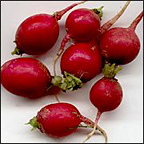
Not a subscriber?
Unsubscribe
Update e-mail address
September 2008 [Volume 7, Issue 9]
To Your Health is brought to you by:
In this issue of To Your Health:
Tai Chi Helps Seniors Stay Steady
 Falls are a serious health risk among older adults. According to the Centers for Disease Control and Prevention, more than one-third of U.S. adults 65 and older fall each year. Furthermore, falls are the leading cause of injury deaths among older adults and the most common cause of nonfatal injuries and hospital admissions for trauma. Fortunately, according to a study published in the July 2008 issue of the American Journal of Public Health, a tai chi program geared specifically toward seniors may reduce the number of falls and improve balance.
Falls are a serious health risk among older adults. According to the Centers for Disease Control and Prevention, more than one-third of U.S. adults 65 and older fall each year. Furthermore, falls are the leading cause of injury deaths among older adults and the most common cause of nonfatal injuries and hospital admissions for trauma. Fortunately, according to a study published in the July 2008 issue of the American Journal of Public Health, a tai chi program geared specifically toward seniors may reduce the number of falls and improve balance.
The study researchers evaluated a community-based, 12-week tai chi program specifically geared toward seniors to see if it improved the incidence of falls and improved balance. A total of 140 seniors at six community centers participated. At the end of the program, there was significant improvement in reach and balance testing, along with a 50-foot speed walk. Although seven seniors reported a fall during the first six weeks of the class, no further falls were reported from weeks 7-12. The program could also be considered a success in that an astonishing 97 percent of the seniors opted to continue tai chi classes after the program ended.
For more information on the many benefits of Oriental medicine, visit www.acupuncturetoday.com.
Herb of the Month – Radish (lai fu zi)
 The radish is a type of vegetable believed to have originated in western Asia, but now cultivated worldwide. Many cultures use radish as a food, either alone or added to salads. In traditional Chinese medicine, radish seeds are an important component of many herbal remedies.
The radish is a type of vegetable believed to have originated in western Asia, but now cultivated worldwide. Many cultures use radish as a food, either alone or added to salads. In traditional Chinese medicine, radish seeds are an important component of many herbal remedies.
Radish seeds can be consumed whole, sliced, grounded into powder or crushed into a type of juice. Radish seeds have pungent, sweet and neutral properties and are affiliated with the Spleen, Stomach and Lung meridians. The two main functions of radish seed are to eliminate food retention, and to move down qi and resolve phlegm.
Radish is often used as a digestive aid to treat conditions ranging from abdominal pain to acid reflux, abdominal distention and diarrhea. Radish seeds are also used to treat cough accompanied by large amounts of phlegm, and asthma. The typical dose of radish is between 6 and 10 grams, decocted in water for oral administration. Radish seeds can also be crushed to create a type of juice.
Whole radishes can be found at supermarkets worldwide. Radish seeds are available at many Asian markets or herbal shops. Radish seeds should be used with caution by patients suffering from qi deficiency. Patients with an inflamed stomach or intestinal inflammation should not consume radish roots. Radish also should not be consumed in conjunction with ginseng.
Always consult your health care provider before taking any herbal or dietary supplement, and be sure to let them know of any medications you may be taking.
Question: I have sciatic nerve damage and as a result, I am on major medication. I fear this is going to destroy my liver. Have you any experience or knowledge of success with either laser or acupuncture treatments?
Answer: Either may help to relieve your symptoms, but more patients respond to pins than to laser light. You would need to try both or go with the pins. Patients I have treated for symptoms of sciatica have improved the severity of their symptoms. In general, you would expect to have 10 to 15 treatment sessions for this. For more information about your individual case, you would want to see an acupuncturist in person.
Do you have a question about acupuncture and Oriental medicine? Visit the "Ask an Acupuncturist" forum at www.acupuncturetoday.com/ask.
Unsubscribe
Thank you for subscribing to To Your Health. If you have received
this newsletter in error or wish to unsubscribe, you may remove your name
from our e-mail subscription list at www.acupuncturetoday.com/newsletter/TYH/unsubscribe.php.
Update your e-mail address
To update the e-mail address your newsletter is sent to, click here.
If you have any questions regarding your subscription, please complete this form at www.acupuncturetoday.com/newsletterhelp/TYH.
